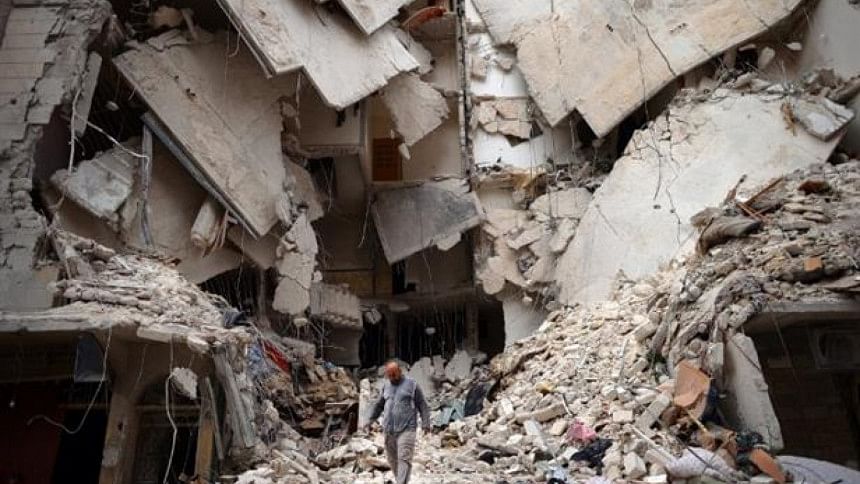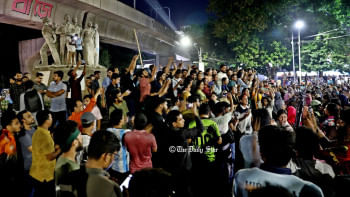Aleppo burning today, whose city is next?

Aleppo is now more than a historic city; it's the boiling point of mankind where human lives are changing into vapour. In this nether region, the forces of evil have come together. At least 400,000 people killed as per the UN estimate, Aleppo is also the punching bag for the powerful nations and their sparring partners. At this moment, it's the greatest concentrated expression of death and destruction on earth. Aleppo is the reflection of an increasingly violent world in a perilous pothole.
The Syrian city has been turned into a slaughterhouse, besides being a theatre for global showdown. Bashar al-Assad is having a showdown against his enemies. The Russians are flexing their muscles against the Western countries, particularly its archrival, the United States. The Iranians are jousting with the Saudis. The Alawites are fighting the Sunnis.
It's an irony that one of the oldest inhabited cities in the world faces depopulation and desolation. But more disturbing is Aleppo's absurd position in a complex network of proxy wars. Its many wars waged inside one, which is being fought because one ruler is desperately clinging to power. It doesn't make sense why it should be anybody's business other than the Syrians.
John Nixon, the CIA official who had interrogated the late Iraqi dictator Saddam Hussain after his arrest, has recently shared his insight with us. He wrote in Time magazine on December 16 that the hanged Iraqi dictator should have been left in power. He said Saddam had warned him during the interrogation that the Americans would fail in Iraq because they didn't know the language and the history of the country, and they didn't understand the Arab mind. Nixon's prescription is that the world may have to deal with the leaders it abhors if it wanted to bring stability back in the Middle East.
The very idea of removing rulers by any means other than popular has proven to be dangerous time and again, because it fumbles more than it fixes. Ideally, the people should have the right to change their governments either by ballot or any means they deem fit for their cause. The people alone should have the power to make that choice and fight for it. Such a change is organic, because it's deeply rooted in people's heart.
Anything imposed doesn't work akin to human immune system designed to reject anything it doesn't recognise. As a matter of fact, inorganic governments are a modern concept. The British used the cookie-cutter approach to create nations after World War II, many of which have been caught in religious, sectarian and ethnic tensions ever since their birth. The creation of India and Pakistan in 1947 is a case in our front yard. Roughly 24 years later, Pakistan was bifurcated because aspirations of people in its two wings couldn't be reconciled.
The mistakes of Afghanistan and Iraq are being been repeatedly repeated in Libya and Syria. Aleppo razed to the ground is reminiscent of Kabul and Baghdad in the earlier years. It's the same vicious circle repeated when people, tempted to escape oppressive regimes, jumped from frying pan into fire. The illusion of freedom has killed more people than the atrocities of autocracy. More people now are living in fear of destruction, dislocation and death than any time before.
Aleppo right now is the sharpest point in the meltdown of humanity. It's the height of horror that this civilisation does little to prevent senseless killing. When the Nazis killed the Jews during the Second World War, the world didn't have the United Nations. Then the world didn't have televisions, mobile phones and other advancements to send information and images at the touch of a button. The Holocaust was a hidden business until the allied forces discovered the Nazi concentrations camps.
In comparison, the tragedy in Aleppo is unravelling frame by frame in front of our eyes. The entire city is a giant gas chamber executing its residents, whose only crime is that they are citizens of a country ruled by an arrogant man. Children in this cauldron of cruelty require psychological support so that they can cope with the stress. Aleppo is a living hell where life is just a fluke between two explosions.
Aleppo is also an affront to human pride in the safe zones of the world. The highfalutin words flowing from the towers of power and the high seats of humanity get drowned out by the sounds of bombs and missiles. This city is yet another reminder that civilisations in the end eat out of the hands of barbarians!
Proof of it exists in the disparate tensions. Terrorists terrorise, and hegemonic nations remain hidebound. Both sides playing with fire, neither is bothered that the world is going to erupt. Aleppo is burning today. Who knows whose city is next?
Mohammad Badrul Ahsan is the Editor of weekly First News and an opinion writer for The Daily Star. Email: [email protected]

 For all latest news, follow The Daily Star's Google News channel.
For all latest news, follow The Daily Star's Google News channel. 



Comments